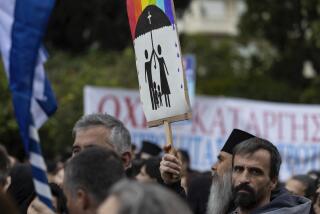THE PULSE OF EUROPE : On the Family : From East to West, Men and Traditional Views Dominate : * Many people are still religious. In Eastern Europe, women yearn to be homemakers again.
- Share via
KOSICE, Czechoslovakia — “An intelligent woman is the enemy of men,” lamented a middle-aged woman pediatrician here in the grim, depressed capital of East Slovakia.
More than a thousand miles away in a suburb of bustling Madrid, Jose Paniagua, the Spanish owner of a car agency and repair garage, set down his maxim about women on the job: “I don’t like women at work, at least in my business. Because they are always asking for time off. . . . If a child gets sick, she is the one who ends up staying home to take care of the kid.”
The world of Europe, whether east or west, is dominated by men.
Not even seven decades of Soviet-style Communism, with all its rhetoric about equality of the sexes, have managed to basically change traditional ideas about the place of women in the Russian home.
“The family is the foundation stone of everything, including the state,” said a man in Leningrad, which will soon revert to its former name of St. Petersburg, sounding a theme somewhat like that of Paniagua in Madrid. “If there is no good family, there will be no foundation for the society to develop. If a woman has spent eight hours in her office, then four hours more standing in line (for scarce goods), she has no time left for her family. And no matter how good our schools are, our nurseries and kindergartens are, they will never bring up a decent person.”
Traditional ideas and values, in fact, still have strong roots in Europe. The Times Mirror survey found this true of attitudes toward family, church and morality as well as women. Yet, though rooted everywhere, these attitudes and values show a myriad of variations in a Europe caught in breathtaking change. Some of the findings in the survey are startling:
* After so many decades of work, East European women, unlike their West European counterparts, yearn to be homemakers again.
* Men in the most macho societies believe that women have never had it so good.
* Many Europeans feel religious but are suspicious of their church--even in overwhelmingly Roman Catholic Poland.
* Years of confinement in a repressive dictatorial society, whether eastern or western, have bred a new moral permissiveness.
West Europeans prefer a family situation in which both husband and wife have jobs and share the responsibility of caring for children and the home. Except for Bulgarians, East Europeans prefer the traditional situation where the husband works while the wife stays home to take care of the house and children.
East European women may simply be tired of years of hard, yet unrewarding work. They also may be showing their resentment at past strictures. With the exception of Bulgaria, East European Communist regimes wanted both husbands and wives to work; agrarian Bulgaria encouraged traditional marriages. Now everyone wants to do the opposite of what was once prescribed.
Replying to men who believe in the traditional family, a middle-aged woman physician in Asenovgrad, an overgrown village near the hills of southern Bulgaria, said, “I would never give up my occupation.” A young woman electronic technician, though without a job, said, “I will never stay at home if I start working in my specialty.”
In Western Europe, the sharing of responsibilities was demonstrated--sort of--by 33-year-old Pierre Garenne and his wife at their pastry shop in the small, set-designer’s-dream village of Doullens in the Picardy region of France. Garenne explained to his American visitors one afternoon that he had not asked his parents for funds to help buy the pastry shop because he wanted independence from them.
“This shop, it is mine,” he said. “I have earned it.”
His wife interrupted. “It is ours,” she said.
He nodded and agreed, “It is ours.”
“Anyway,” she said, “that’s the truth.”
“Yes,” he agreed, “that’s the truth.”
“We have built this together,” she said.
A chastened Garenne nodded his agreement.
The traditional family has become a haven for East Europeans in turmoil. “I think I’m a pessimist, no expectations at all,” said a 50-year-old woman in Kiev, the capital of the Ukraine. “I want to have some hopes for the better, but I do not have. The only thing which cheers me up is my family.”
“I see some warmth in my private life, in my family,” said a young bachelor in Kiev, “and I feel cold in relations with others. We can express the things which are happening today with an old proverb: ‘My home is my fortress.’ It is an ancient truth and makes sense today.”
Most Europeans believe that life is better for men. Ironically, however, men in the two most macho societies disagree--an overwhelming majority of males in Spain and Italy insist either that life is the same for both sexes or that women have a better life than men.
The women disagree, of course, but not substantially. Few Spanish and Italian women believe that life is better for them, but the rest divide evenly over whether life is better for men or the same for both sexes.
The different perspectives of men and women are particularly obvious in Spain. “Spanish men have the complex of being macho, of being chauvinists, and this actually leads them to be more tolerant with women,” said Joaquin Estefania, the editor of the authoritative Spanish newspaper El Pais. “So, women in Spain actually have it better than in Northern European countries. I am almost certain that women hold better positions here.”
But Maite de Guindos, a 30-year-old Madrid lawyer, insisted that some men refuse to deal with her even though she is in charge of her law office. Instead, they prefer to talk with her brother or an economist who works in the office
“I am the one who is supposed to make all the decisions here,” she said. “But they want to talk to the other guy. So then, the other guy has to tell me everything so that I can make the decision before he gets back to them. But they are satisfied because they are talking to a man. It is ridiculous. It is absurd. Completely ridiculous.”
West Europeans are less religious, less moralistic and less traditional in their values than Americans. But West Europeans differ sharply among themselves: Italy and Spain are the most old-fashioned, France the most alienated from traditional beliefs. Within Eastern Europe, heavily Catholic Poland and Lithuania are the most religious, moralistic and traditional. Religious beliefs are largely rejected elsewhere in the East.
Yet, though religion is strong in Poland, the Roman Catholic Church is in trouble there. The Solidarity trade union movement and the church led Poland’s struggle against communism. Yet, a backlash has developed now that the battle has been won.
“The church interferes too much in the intimate life of a person, decidedly too much,” said a law student in the large town of Bialystok in eastern Poland.
“The church teaches only backwardness and narrow thinking,” added a teacher in the same city. “Recently, I attended an obligatory course in premarital education every week. I wasted a whole month. It was completely useless. I cannot repeat a single reasonable sentence from what we were told.”
“Poland is not yet a democratic country because of the lack of a counterbalance to the church,” commented the manager of a Bialystok housing cooperative.
Poles have obviously been antagonized by the church’s stand against abortion, its demand for compulsory religious classes in public schools and its attempt to eliminate the constitutional separation of church and state. “Like the trade unions,” said a Polish priest, “the church has found itself in a completely new situation. They are not doing what they ought to be doing, and they both must change.”
In Russia, the feelings are much different. Religious belief is not overwhelming, but it is respectable. After more than 70 years of official atheism, as many Russians as French believe in God. But young Russians are far less religious than their elders, and there is a growing suspicion about the new enthusiasm of politicians for the Russian Orthodox Church.
A woman in Leningrad, for example, believed that government leaders were trying feverishly to find a substitute for “our outdated and depreciated ideological values such as Marxism-Leninism.”
“Certainly, they have turned their attention to the Orthodox Church without hesitation,” she said. “ . . . Maybe it is not at all bad. Life will show what will come of it.
“But there was one circumstance which stuck me unpleasantly,” she went on. “I watched TV and was struck by the parade of clergymen in rich vestments, covered with diamonds--all this against the background of the unhappiness in this country, where there are many children deprived of their share, unfortunate families, and people who suffer of food shortage.
” . . . It seemed to me that religion is far from the real needs of the people; it is dangerous to my mind.”
On certain moral issues, Spain and Eastern Europe have a special affinity. They display a permissive attitude toward pornography and an aversion to censorship of any kind. More Spaniards than other West Europeans rejected constraints on newspapers, and more Spaniards accepted the proposition that nude magazines and explicit sex movies are harmless.
It has only been 15 years since the transition from fascism to democracy in Spain. Most Spaniards remember the era of fettered newspapers and banned movies and do not want to experience anything like it again. In the early 1970s, during the Francisco Franco era, Spaniards had to travel to France to see movies like Bernardo Bertolucci’s “Last Tango in Paris” and even Charlie Chaplin’s “The Great Dictator.” When the latter film did play in Spain after Franco’s death in 1975, the movie marquees proclaimed, “At Last! After Forty Years.”
Spain’s permissiveness is exceeded only by that of several East European countries and the Soviet republics, where the experience of censorship is even fresher in everyone’s mind.
But the permissive attitude has been accompanied by a surge of crime in these former totalitarian states. For some Spaniards and East Europeans, the disappearance of the police state has provoked some unpleasant experiences.
Large segments of the Spanish population are worried about drugs, crime and violence. No other West European country has similar fears. But most East European countries do.
The surge in crime--up by 50% in some East European countries--has even improved the popular view of the police. At one time, all police were suspect in Czechoslovakia, whether secret police or ordinary police. The secret police, in fact, used ordinary police for surveillance and other political work.
But that has been forgotten with the fears of crime. “Yes, I trust normal, ordinary police,” said a woman doctor in Prague. “They are very important to ensure public order.”
THINKING ABOUT THE CHURCH Most believe the church is a generally good influence in their country, though many aren’t sure either way.
Country Bad influence Good influence Czechoslovakia 13% 49% Germany (total) 23% 54% Poland 39% 46% Germany (East) 15% 62% Hungary 15% 59% Russia 4% 68% Bulgaria 10% 60% Germany (West) 24% 52% Lithuania 5% 83% Ukraine 6% 77%
More to Read
Sign up for Essential California
The most important California stories and recommendations in your inbox every morning.
You may occasionally receive promotional content from the Los Angeles Times.













